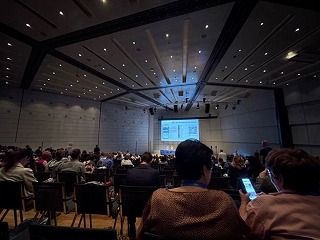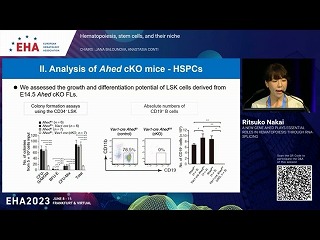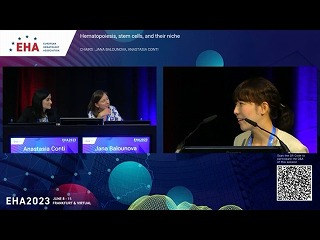28th EHA Congress Travel Award 受賞レポート 中井 りつ子
.jpg)
名前:中井 りつこ【大阪大学大学院医学系研究科 血液・腫瘍内科学】
発表形式:Oral
Title:
A new gene Ahed plays essential roles in hematopoiesis through RNA-splicing
Authors:
Ritsuko Nakai 1, Takafumi Yokota 1, 2, Masahiro Tokunaga 3, 4, Mikiro Takaishi 5, Takao Sudo 1, Henyun Shi 1, Yoshiaki Yasumizu 6, 7, Daisuke Okuzaki 7, 8, Chikara Kokubu 4, Sachiyo Tanaka 4, Katsuyoshi Takaoka 9, Ayako Yamanishi 4, Junko Yoshida 4, 10, Hitomi Watanabe 11, Gen Kondoh 11, Kyoji Horie 4, 10, Naoki Hosen 1, 7, 12, Shigetoshi Sano 5, and Junji Takeda 13
Affiliations:
1. Department of Hematology and Oncology, Graduate School of Medicine, Osaka University, Osaka, Japan
2. Department of Hematology, Osaka International Cancer Institute, Osaka, Japan
3. Department of Hematology, Suita Municipal Hospital, Osaka, Japan
4. Department of Genome Biology, Graduate School of Medicine, Osaka University, Osaka, Japan
5. Department of Dermatology, Kochi Medical School, Kochi University, Japan
6. Department of Experimental Immunology, Immunology Frontier Research Centre, Osaka University, Osaka, Japan
7. Integrated Frontier Research for Medical Science Division, Institute for Open and Transdisciplinary Research Initiatives, Osaka University, Osaka, Japan
8. Genome Information Research Centre, Research Institute for Microbial Diseases, Osaka University, Osaka, Japan
9. Developmental Genetics Group, Graduate School of Frontier Biosciences, Osaka University, Osaka, Japan
10. Department of Physiology II, Nara Medical University, Nara, Japan
11. Laboratory of Animal Experiments for Regeneration, Institute for Frontier Medical Sciences, Kyoto University, Kyoto, Japan
12. Laboratory of Cellular Immunotherapy, World Premier International Immunology Frontier Research Center, Osaka University, Osaka, Japan
13. Research Institute for Microbial Diseases, Osaka University, Osaka, Japan
Abstract:
Background: The development of hematopoiesis in mammals is regulated by coordinated actions of multiple genes. Mutations in some genes are intimately involved in the occurrence of hematological cancers. Given that responsible mutations are yet to be determined in a subset of patients with blood cancers, it is important to identify unknown essential genes in the development of the lympho-hematopoietic system.
Aims:We attempted to discover novel functional genes by screening for abnormalities in mutant embryonic stem cells (ESCs) regarding the hematopoietic differentiation potential.
Methods: We had previously constructed a homozygous mutant ESC bank by introducing gene-trap insertion vectors and inducing loss-of-heterozygosity in ESCs through transient suppression of the Bloom syndrome gene expression. This mutant ESC bank was used to screen for recessive genetic abnormalities for the development of hematopoietic cells. In vitro differentiation assays of ESCs toward the hematopoietic lineage were performed using a co-culture system with OP9 stromal cells.
Results: Among the homozygous mutant ESC clones tested, one clone was severely impaired in terms of differentiation potential toward hematopoietic cells. In this clone, the gene-trap vector was inserted in a previously uncharacterized gene, which locates on mouse chromosome 9, in a biallelic manner. We have named the gene “attenuated hematopoietic development (Ahed)”, according to its function. The gene expression database indicated that the expression level of Ahed was higher in hematopoietic tissues than in other tissues. To understand its specific roles in the hematopoietic system, we generated Ahed conditional knockout (cKO) mice by crossing Ahed-floxed mice with Vav1-cre transgenic mice. We found that fetuses of Ahed cKO mice became anemic after E14.5, characterized by fetal liver atrophy, and died before birth. We analyzed the E14.5 liver of Ahed cKO fetuses to determine the significance of Ahed in fetal hematopoiesis. Flow cytometric analysis revealed that erythroid cells were significantly decreased in Ahed cKO livers. In contrast, a substantial number of lineage -Sca-1 +c-Kit Hi (LSK) cells remained, whose phenotype corresponded to hematopoietic stem/progenitor cells (HSPCs). Transplantation experiments revealed that Ahed-deficient LSK cells could not reconstitute hematopoiesis in vivo. Collectively, these data determined that Ahed is indispensable for functional HSPCs. Based on its nuclear localization, we reasoned that the Ahed protein is functionally involved in intranuclear events. High-throughput RNA sequencing analyses of Ahed-cKO cells revealed that the protein governs various critical pathways by regulating alternative splicing of immature RNAs. Indeed, we confirmed that Ahed deficiency induces abnormal transcripts of critical genes for hematopoiesis. Importantly, published databases of cancer-related mutations present blood cancer patients with somatic mutations of the Ahed gene. Thus, Ahed is a newly discovered regulator essential for the integrity of hematopoiesis, whose mutations are likely to underlie hematopoietic malignancies.
Conclusion: We have successfully identified a previously uncharacterised gene, Ahed, whose perturbation disrupts the development of hematopoiesis both in vitro and in vivo. The results shed light on the feasibility of in vitro differentiation screening assays using a mutant ESC bank. Since mutations of Ahed human orthologues were repeatedly found in cancer patients, further analyses of the molecular mechanism underlying their function might pave the way for novel cancer therapies.
EHA2023参加レポート
この度はEHA2023 Hybrid Congressへの参加にあたり,JSH Travel Award for EHA Congressに採択いただきまして,誠にありがとうございました。
今年のEHA Congressはドイツのフランクフルトでハイブリッド開催され,世界各国から1.5万人を超える参加があり,COVID-19の影響を全く感じさせない盛況ぶりでした。今回,私の研究テーマである造血幹細胞の基礎研究に関する発表は限られておりましたが,CAR-T細胞療法やbispecific抗体薬をはじめとした新規治療薬の発展は目覚ましく,日進月歩の血液内科診療を文字通り肌で感じることができました。Debate sessionでは,各症例に対する治療選択の会場内アンケート結果がスクリーンに即時に反映されながら議論が進められ,audience側も主体的に参加することができました。学会で特に印象的だったのは,海外の若手研究者たちのプレゼンテーション能力の高さと質疑応答などでの積極性でした。決して英語の言語能力だけでは測ることのできない“話力”についても今後高めていく必要性を痛感しました。また,今回のEHA Congressでは,女性で招待講演や座長を務めておられる先生が多かったことは大変良い刺激となりました。

フランクフルトは広大で開放的な中央駅を街の玄関とし,周辺に金融都市らしい高層ビル群が広がる一方で,近くを流れるマイン川からは大聖堂を含む旧市街の全体像を眺めることができ,旧市庁舎レーマー広場には木組みの建物が広場を取り囲むドイツらしい街並みが広がっています。噂通りビールは水より廉価であり,今回,発表を終えたあと指導教官の横田先生とプレッツェル片手に乾杯していただいたビールは格別に美味しかったです。

私自身は,最終日の6月11日(日)にHematopoiesis, stem cells, and their nicheのsessionで口演発表の機会を頂き,独自のマウス変異胚性幹細胞ライブラリを用いたin vitroアッセイによって,造血に不可欠な役割を果たす新規遺伝子を同定した研究を報告しました。この遺伝子は胎生期の造血発生に必須であることからAhed(Attenuated hematopoietic development)と命名し,Ahedが造血幹・前駆細胞の造血再構築能の維持に寄与していることをin vitroとin vivo双方の解析において示しました。AhedはヒトのオルソログであるC11orf57を含めてもこれまで世界的に全く報告されておらず,この分子機構のさらなる解明が新たな造血器腫瘍制御の開発に繋がる可能性を述べ,発表を締め括りました。
海外学会でのoral presentationは今回が初めてでしたのでもちろん緊張感もありましたが,座長のDr. BalounovaとDr. Contiが温かく迎えて下さり,発表後には海外の若手研究者から活発な質問をいただいたほか,Dr. Balounovaから造血発生の解析に関する示唆的なご意見をいただいたおかげで,当初長く不安に感じていた15分間の発表時間も終わってみればあっという間で,研究内容はもとより,英語での質疑応答やプレゼンテーションの技術も高めて,いつかまたこの場に戻ってきたい,との思いに至りました。

最後になりますが,本研究をJSH Travel Award for EHA Congressに採択して下さった日本血液学会国際委員会の関係各位に心から感謝申し上げると共に,本選考への応募を薦めて下さった保仙直毅教授,本研究をご指導下さった横田貴史先生,並びに,日頃私の研究に携わっていただいている全ての方々にこの場を借りて厚く御礼申し上げます。今回,このような貴重な経験を通じて得たことを,日々の研究・臨床・教育にしっかりと生かして参りたいと思います。本当にありがとうございました。
